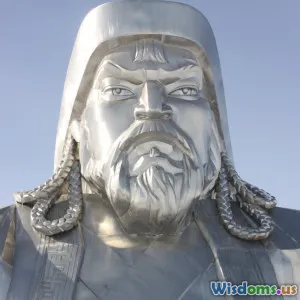
Change Makers: Historical Figures Who Inspired Progress
8 min read Explore the lives of iconic change makers who reshaped history and inspired progress across worlds. (0 Reviews)
Change Makers: Historical Figures Who Inspired Progress
Throughout history, certain individuals have stood out as beacons of transformation—people who defied conventions, challenged injustices, pioneered innovations, and ultimately propelled society forward. These change makers are not just names etched in textbooks; their legacies resonate today, motivating us to reflect and act. In this article, we delve into the lives of influential historical figures whose courage, vision, and resilience inspired waves of progress.
Defining a Change Maker
What separates a change maker from others? At its core, a change maker alters the status quo by introducing new ideas, initiating reforms, or catalyzing movements that shift society’s direction. These individuals often face resistance—sometimes immense—but their commitment to progress transcends obstacles.
Whether through political activism, scientific discovery, or social leadership, each historical figure we explore has impacted the world significantly and sustainably.
Visionaries in Politics and Social Reform
Mahatma Gandhi: Champion of Nonviolent Resistance
Mahatma Gandhi revolutionized political movements by advocating nonviolent civil disobedience as a powerful tool against colonial oppression. His leadership in India’s struggle for independence exemplifies how morally grounded strategies can challenge seemingly insurmountable power structures. Gandhi’s philosophy influenced movements globally, from the American Civil Rights Movement to anti-apartheid activities in South Africa.
"You must be the change you wish to see in the world."
Gandhi’s methods extended beyond mere political gain; they underscored dignity, justice, and self-reliance as pillars for progress.
Harriet Tubman: The Conductor of Freedom
Harriet Tubman stands as a testament to courageous activism. Born into slavery, she escaped and then risked her life repeatedly to lead others via the Underground Railroad to freedom. Tubman’s fearless dedication not only liberated hundreds but also heightened awareness about the brutal realities of slavery, fueling abolitionist movements.
Her work during the Civil War, including espionage for the Union army, demonstrated multifaceted contributions to progress beyond the immediate struggle.
Martin Luther King Jr.: Voice of Equality
Building upon the nonviolent framework popularized by Gandhi, Martin Luther King Jr. galvanized the American civil rights movement. His eloquence and leadership culminated in pivotal events like the 1963 March on Washington, where his "I Have a Dream" speech inspired millions worldwide.
Through persistent advocacy, King helped break down institutionalized racial segregation and discrimination, embedding civil rights as a central issue in public consciousness.
Pioneers of Science and Innovation
Nikola Tesla: The Unheralded Genius of Electricity
Nikola Tesla’s inventions and theories around alternating current power systems laid the groundwork for modern electrical usage. Despite battling financial challenges and a lack of recognition during his lifetime, Tesla’s innovations remain fundamental to contemporary technology—from how power grids deliver energy to the proliferation of wireless communication.
Tesla’s visionary thinking also extended to early radio technology and magnetic resonance, underscoring his multifaceted contributions.
Marie Curie: Trailblazer in Radioactivity
Marie Curie shattered gender barriers while advancing the understanding of radioactivity—a term she coined. She became the first person to win Nobel Prizes in two distinct scientific fields: Physics and Chemistry.
Her groundbreaking research paved the way for medical advancements like cancer treatment through radiation therapy, evidencing profound societal benefits.
Charles Darwin: Architect of Evolutionary Biology
Charles Darwin’s theory of evolution by natural selection reshaped biological sciences and our understanding of life’s diversity. His seminal work, "On the Origin of Species," challenged existing beliefs and invited intense scrutiny and debate.
Beyond biology, Darwin’s insights influence disciplines ranging from psychology to anthropology, fundamentally altering our worldview.
Cultural and Artistic Innovators
Frida Kahlo: Expressing Identity and Struggle Through Art
Frida Kahlo used art as a conduit for personal expression and cultural identity, particularly reflecting the experience of indigenous Mexican women. Her surreal and emotionally charged self-portraits grappled with pain, resilience, and feminism, inspiring generations of artists and activists.
Kahlo’s legacy extends beyond technique; she exemplifies how creative expression can empower marginalized voices.
Leonardo da Vinci: Polymath Ahead of His Time
Leonardo da Vinci epitomizes intellectual curiosity and interdisciplinary excellence. His legacy includes masterpieces in art, detailed anatomical studies, and pioneering designs in engineering and flight.
Da Vinci's notebooks reveal a mind ceaselessly engaged in understanding the natural world, embodying the Renaissance ideal of integrated knowledge pursuit.
The Enduring Impact of Historical Change Makers
Change makers shape history not only through their direct achievements but also by inspiring others to continue the journey toward progress. Their stories carry lessons in courage, innovation, and perseverance.
Today, challenges such as climate change, inequality, and technological ethics call for similar boldness. Understanding how previous figures confronted obstacles and envisioned new realities equips us with perspective and motivation.
Conclusion: Becoming Change Makers in Our Time
The legacies of historical figures like Gandhi, Tubman, Curie, and da Vinci remind us that progress often begins with individuals daring to dream and act differently. Their varied paths—whether on battlegrounds for justice, laboratories for discovery, or studios of expression—prove there is no singular route to sparking change.
As we reflect on their courage and innovation, we are invited to ask ourselves: How can we harness our talents and passions to make a meaningful difference today?
In embracing this question, each of us holds the potential to be a change maker, continuing the timeless tradition of inspiring progress across generations.
By studying history’s change makers, we don’t just learn about the past—we equip ourselves with the mindset and tools necessary for shaping a better future.
Rate the Post
User Reviews
Popular Posts




















